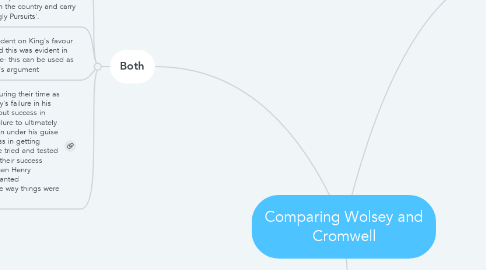
1. Wolsey
1.1. Character and personality
1.1.1. Wolsey described as 'energetic and ebullient' by guy
1.1.2. Wolsey was incredibly hard working which Guy acknowledges as a cause for his rapid rise to power
1.1.3. He was adept at putting aside his own desires in order to further the desire of the King in order to gain his trust be being 'the first and foremost to advance the King's will
1.1.4. Wolsey's critics argue that his main character flaw was his greed and extravagant nature- which led to him ruthlessly carrying out a 'host of abuses of power'
1.2. Relationship with Henry
1.2.1. Guy states that one reason for Wolsey's unpopularity was his close relationship with the King- describes their relationship as like 'partners'
1.2.2. His relationship as described by Guy meant 'his political rivals envied the privileged access he obtained to the King'- shows the closeness of their relationship
1.2.3. Henry gave Wolsey favour and patronage in return for Wolsey running the Kingdom and allowing Henry to carry out his Kingly pursuits
1.3. Relationship with others
1.3.1. Guy effectively argues that Wolsey's unpopularity was not due to 'unfit behaviour' as he is said to have tried to 'govern consensually'. Brings other factors like jealousy and social status into the mix
1.3.2. Guy states a key area of contention was Wolsey's tendancy to adopt 'ministerial' tactics which were against the wishes of the majority of Henry's court who also despised Wolsey's low birth (GCOB)
1.4. Religious matters
1.4.1. Wolsey's authority as the Pope's representative in England was dependent on Henry's favour so religious matters were carried out to benefit the King
1.4.2. Wolsey crucially unable to get Henry what he wanted in terms of marriage and succession- his indecision and dilemma to choose between Pope and King led to his demise
2. Cromwell
2.1. Religious matters
2.1.1. Cromwell significantly more proactive in seeking to influence religious reform than Wolsey- e.g. he even gave £400 of his own money towards printing and distribution of an English bible in every Parish
2.1.2. Whilst Wolsey used Henry's favour to maintain his own power and lifestyle- Cromwell used Henry's favour to try and further manipulate religious reform- e.g. he tried to form an alliance between England and the German Protestants after it seemed England had become isolated against Catholic Europe.
2.1.3. Ultimately Cromwell was victim to Henry being influenced from other elements of the court and also to the King's sudden desire to retake control of religious affairs
2.1.4. Cromwell able to get Henry religious change he wanted (and financial gain of dissolving monasteries) and also give him the divorce and power over the Pope that he so desired
2.2. Character and personality
2.2.1. Described as more subtle and less emollient than Wolsey and less politically secure
2.2.2. Thomas More describes Cromwell as someone who 'knew his own strength'
2.2.3. Whilst Wolsey was envied rather than feared Cromwell was feared rather than envied
2.2.4. Guy describes his political outlook as 'partisan' and this arguably was a driving force for his attempts at religious reform
2.2.5. Public character that Cromwell showed was one as a genius administrator- or a 'fixer'- Guy argues it covered up
2.2.6. Whilst Wolsey was relatively loyal Cromwell was adept enough to cut ties with his former 'allies' - e.g. Anne Boleyn if it would preserve his position but showed loyalty at other times (e.g. to Wolsey)
2.3. Relationship with the King
2.3.1. Whilst Wolsey came to the fore due to his similar personality to the King, Cromwell took the chance
2.3.2. Cromwell didn't have the same power or security with the King as by 1530's Henry didn't need a partner to run the country with him- and even after pilgrimage of Grace Guy states Henry said Cromwell was elected to the Privy Council due to his administrative skills not for any other reason
2.3.3. Whilst not as influential as Wolsey it cannot be underestimated how much influence Cromwell had on the King
2.4. Relationship with others
2.4.1. Cromwell was disliked by many and feared/treated with suspicion because of his links to reformists and radicals who advocated the reformation
2.4.2. He alienated himself from nobility due to his low status and his dissolution of the monasteries (i.e. dissolving Thetford monastery was a cause of his downfall due to his angering of the Duke of Norfolk)
2.4.3. Cromwell's attempt to push forward the reformation meant that he angered the conservative faction in Henry's court and others like Catholics saw him as a heretic and someone
